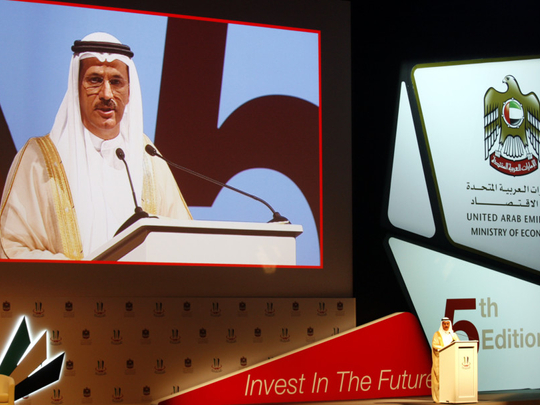
Dubai: Despite the drop in global oil prices, the UAE economy is expected to continue to grow due to the emirates’ strategic plan to diversify its economy, Sultan Al Mansouri, UAE Minister of Economy said on Monday at the opening ceremony of Annual Investment Meeting (AIM) 2015 in Dubai.
Under the theme “Sustainable Development through FDI Induced Innovation and Technology Transfer”, the three-day event, AIM 2015, kicked off at the Dubai International Convention and Exhibition Centre with the participation of senior official and business professionals from 144 countries.
“Although the UAE is now less dependent on natural resources as a source of revenue, petroleum and natural gas exports still play an important role in our national economy. However, our continued efforts for the diversification of the UAE economy are slowly but surely paying off,” Al Mansouri said.
Oil was selling for more than $115 (Dh422) a barrel in June of last year. Today it is selling below $60 a barrel.
“The UAE government has set its target to reduce the dependence on oil revenue to less than 10 per cent of Gross Domestic Product (GDP) in the upcoming years,” he added.
In 1970 oil used to count for more than 90 per cent of GDP, but currently the contribution of non-oil sectors to the GDP has increased to register 69 per cent.
“Oil, our primary resource in 1971, today accounts for less than a third of the GDP,” Al Mansouri said.
“Factors like the decline in oil prices or the depreciation of the euro, adding to this the slower growth rate of developing countries, are affecting different countries in different ways and reshaping the global economy,” he said.
The average growth rate of developing countries is projected to rise moderately from 3.3 per cent in 2014 to 3.5 per cent in 2015 according to the International Monitory Fund (IMF).
Foreign direct investment
The UAE recorded 25 per cent growth in FDI, which exceeded $13 billion in value, Al Mansouri said.
“FDI has direct impact on economies such as providing capital for enterprises, creation of new job opportunities, increase of government revenues and surges in foreign currency reserves,” he said.
However, the real impact of FDIs on economic development comes from indirect means such as technology transfer, scientific know-how, sharing management and organisational best practices, as well as fostering competition and innovation, according to Al Mansouri.
The current edition of the AIM is aligned with the UAE’s strategy to build an economy that is based on knowledge, innovation and creativity.
Investment in science, technology and research are top priorities for the United Arab Emirates. This is aligned with the federal government’s ambitious UAE Vision 2021 and its strategy for sustainable economic growth and competitiveness, Al Mansouri said.
Dawood Al Shezawi, CEO of AIM’s organising committee, said: “Innovation is a key discussion point in AIM, as innovation plays an important role in the transformation toward a knowledge-based economy.”
New Laws
“The UAE government is strongly committed to removing bureaucratic hurdles that foreign investors face by providing an enabling investment environment supported by progressive legislations and laws,” Al Mansouri said.
Currently, there are a number of federal laws being developed such as the Companies Law, and Commercial Arbitration Law. Notably, the ministry has also recently launched the Corporate Governance Guide.
“We are now in an advanced phase with regard to drafting a new federal Law of Foreign Direct Investment that allows 100 per cent foreign ownership in some activities and sectors outside free zones,” Al Mansouri added.












